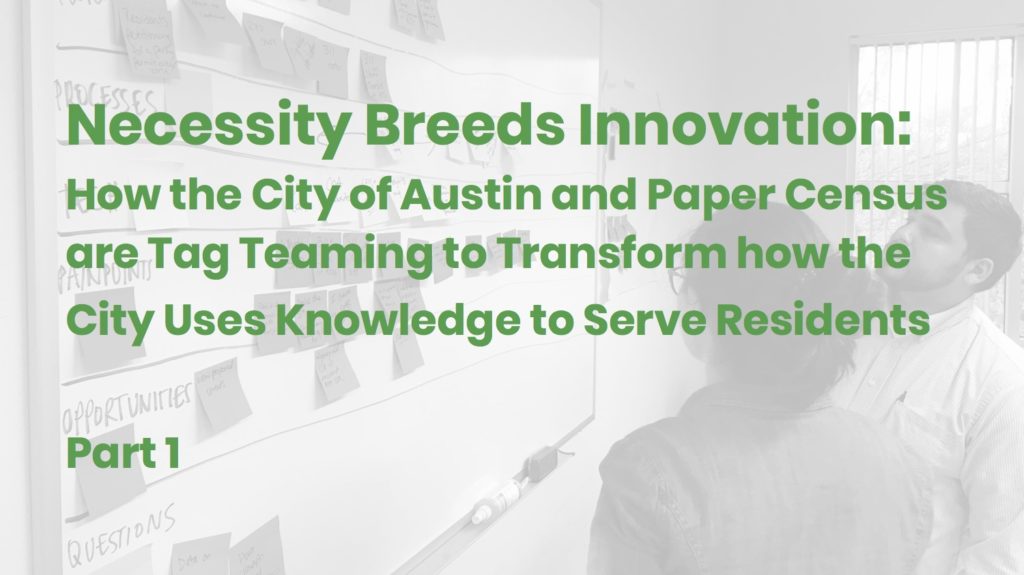Part 1
By Puja Balachander, User Researcher, City of Austin Communication and Technology Management, Office of Design and Delivery, and Sarah Ortiz Shields, Program Manager, Austin Tech Alliance
Imagine a city with a single front door, where no matter what a resident needed, the city would use all the information it had to collaborate and seamlessly deliver services to them. Advancing the City of Austin towards this vision was what Austin Tech Alliance and Office of Design and Delivery teams were tasked with through two separate projects: Paper Census and City Knowledge Management and Collaboration.
Austin Tech Alliance is a nonpartisan nonprofit founded to promote civic engagement in Austin’s tech sector. Our focus is on educating the tech grassroots on policies that impact them, advocating for using tech as a tool to help solve civic challenges, and activating the tech sector to speak up, participate, and vote. ATA’s Paper Census project is a collaboration with the City of Austin to identify paper-based processes that are a hassle for residents, then research, design, and deliver digital prototypes.
The Communication and Technology Management’s Office of Design and Delivery provides an opportunity for Austin’s passionate and civic-minded designers and developers to bring the principles, values, and practices of the technology sector into government. The Knowledge Management and Collaboration project is an effort to help the City of Austin to use the information it collects and creates to better collaborate and deliver seamless services to residents.

The two projects had similar goals: identify and prioritize services that reap the most benefits from a paperless transformation, and improve how the City uses the information it creates and collects to collaboratively deliver services to residents. It just made sense for the two of us to work together on such ambitious and complementary projects so we could support each other with research, outreach, and collaboration.
When we met to discuss how we might work together, we realized that a lot of information isn’t used or shared effectively because it’s trapped on paper. Both of us agreed that neither working on knowledge management tools like intranets or databases nor working on digitizing paper processes was the answer unless we ensured that the information collected and created by the City could be used to make services better for both residents and staff.
So we’re focusing our energies on where our objectives are most complementary: helping high impact service teams use the data they create and collect to deliver better services to residents and the City. By helping multiple service teams across the City use and share their knowledge effectively (which is often stymied by paper-intensive processes), we will see common themes and learn lessons that can inform knowledge management principles and strategy citywide.
We’re now working with a few brave service teams to figure out how to solve their problems. Stay tuned for our next post on our partners and approach. Meanwhile, if you’re interested in what we’re up to, reach out!
- Stay up to date, help us prototype, and attend one of our workshops! Visit papercensus.org/get-involved to sign up.
- Are you part of a City service team that wants to work with us? Would you like to be invited to our share outs and learn about what we’re learning and our process? Contact puja.balachander@austintexas.gov and sarah@austintech.org today.

